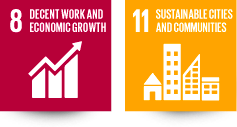MGE and the goals of ESG guidelines.
Commitment to sustainability
FOCUS ON.
Environmental, social, economic well-being
Organizations and individuals are gradually coming to a fundamental realization: it is not possible to assume infinite growth for our societies, given that our planet offers limited and often nonrenewable natural resources.
The current development model is unsustainable not only environmentally but also economically and socially. All countries are therefore called upon to contribute to the effort to bring the world onto a path of sustainability.

''Man has a fundamental right to freedom, equality and satisfactory living conditions in an environment that enables him to live in dignity and well-being, and is highly responsible for the protection and improvement of the environment before future generations.''
ESG Criteria.
The acronym ESG, now less and less unfamiliar even among the uninitiated, encapsulates the 3 basic guidelines that the European Union has defined for verifying, measuring, monitoring and sustaining a company’s or organization’s sustainability efforts:
✓ And of Environmental (environment), it represents the criteria by which a company’s behavior toward the environment in which it operates and the environment in general is evaluated.
✓ S of Social, represents the criteria that assesses social impact in relation to the area, people, employees, suppliers, customers, and more generally the community with which it relates.
✓ G of Governance, these are the ethical principles by which corporate management is guided, such as compensation of people, transparency of business decisions and respect for minorities.
Sustainable Development Goals
Defined by the United Nations in 2015, these are 17 global goals to be achieved by 2030, broken down into more than 160 specific targets, within a development vision based on inclusiveness, universality and participation. For the first time these goals are addressed not only to institutions but to a plurality of actors including businesses, representing towards them a real call to action.

MGE for sustainability
Smart Working
The Covid 19 pandemic has induced a radical shift in many work habits, chief among them the possibility for people to do their work remotely whenever possible.
MGE sees Smart Working as an opportunity to improve the quality of life for its employees, to be combined with the corporate goal of providing customers with excellent products and services.
Smart Working is applied in the company by observing the following hierarchy of principles.
1 - Health and Safety of Employees
This is the most important factor, which was preponderant during the acute phase of the Covid 19 pandemic.
2 - Business goal of excellence
MGE develops a business based on intangible products and services, which generally enables employees to conduct their business remotely.
At the same time, there are a number of situations that require the activity to be carried out in the presence, such as the need for continuous and instantaneous confrontation between people, the performance of a task that cannot be remote, the training needs of a newly hired colleague, the specific needs of certain clients, etc.
If the circumstances related to remoting the business are in line with the business goals of developing excellent products/services, MGE is in favor of Smart Working.
3 - Quality of life of employees
This principle applies in MGE for all kinds of situations, whether in-person or remote work. With regard to Smart Working, this is concretely applied where principle 2, the one related to corporate excellence goals, is met.
Investment and results
Precisely to go along with the inclination to foster Smart Working, after the pandemic event from Covid 19 MGE made a major investment to completely redo its IT infrastructure, with the dual strategic goal of making it adequate to enable Smart Working while ensuring a high standard of Information Security for the benefit of customers and employees.
This initiative was finalized with the achievement in late 2022 of the Tisax label, issued by the ENX Association, which is required by many automakers as proof of compliance in dealing with highly sensitive information typical of the automotive industry with high security standards.
Sustainability goals achieved through Smart Working
Number of Smart Working hours: 17,840
Car kilometers saved: 112,000
CO2 offset: 16.8 tons
